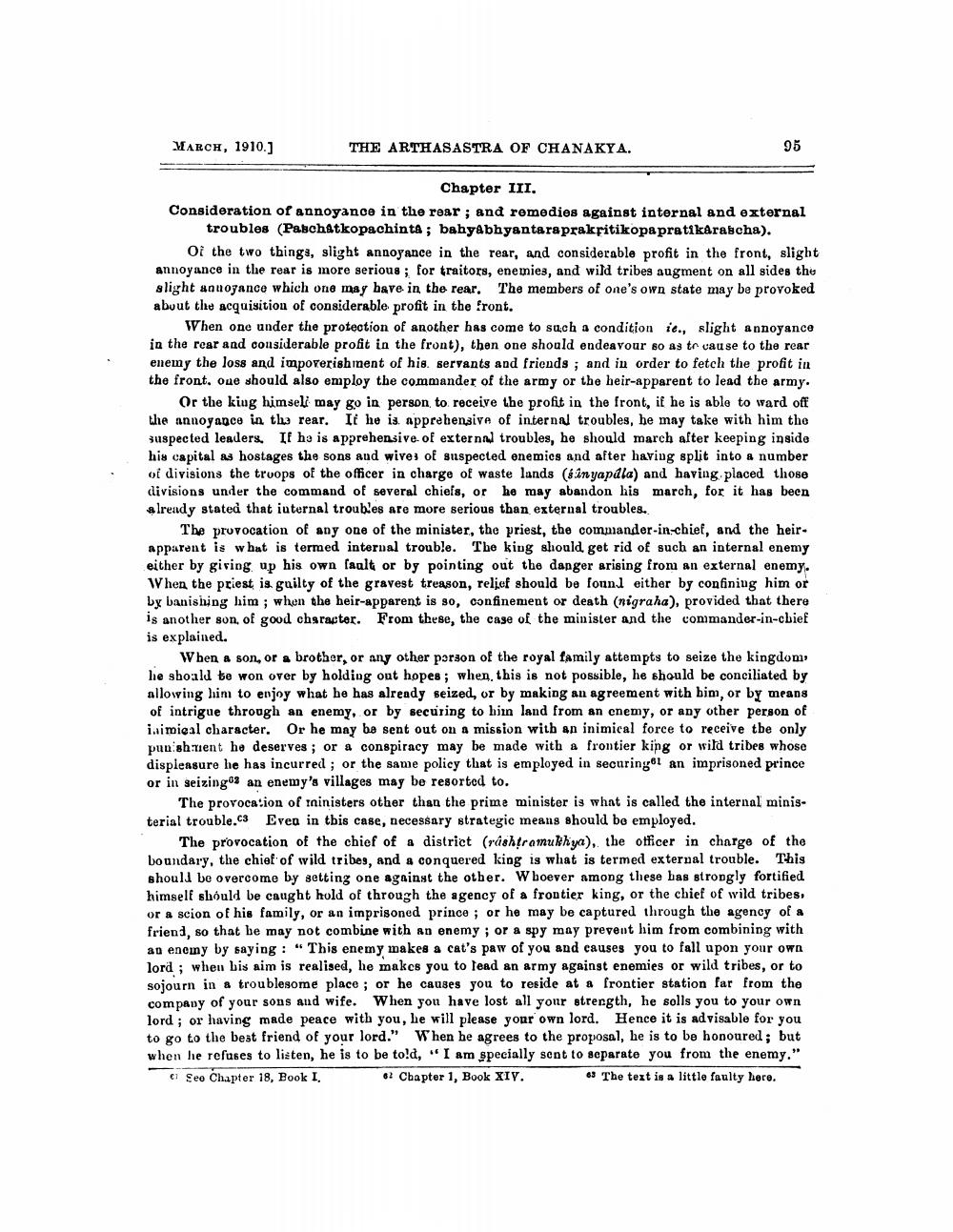________________
MARCH, 1910.)
THE ARTHASASTRA OF CHANAKYA.
95
Chapter III. Consideration of annoyance in the rear; and remedies against internal and external
troubles (Paschatkopachinta; bahyabhyantaraprakritikopa pratikarabcha).
Of the two things, slight annoyance in the rear, and considerable profit in the front, slight annoyance in the rear is more serious ; for traitors, enemies, and wild tribes augment on all sides the slight souogance which one may have in the rear. The members of one's own state may be provoked about the acquisition of considerable profit in the front.
When one under the protection of another has come to such a condition it., slight annoyance in the rear and considerable profit in the front), then one should endeavour so as tr uause to the rear enemy the loss and impoverishinent of his servants and friends, and in order to fetch the profit in the front, oue should also employ the commander of the army or the heir-apparent to lead the army.
Or the king himseli may go in person to receive the profit in the front, if he is able to ward off the annoyance in the rear. It he is apprehensive of internal troubles, he may take with him the suspected leaders. If he is apprehensive of external troubles, he should march after keeping inside his capital as hostages the sons and wives of suspected enemics and after having split into a number of divisions the troops of the officer in charge of waste lands (sinyapala) and having placed those divisions under the command of several chiefs, or he may abandon his march, for it has been already stated that internal troubles are more serious than external troubles..
The provocation of any one of the minister, the priest, the commander-in-chief, and the heirapparent is what is termed internal trouble. The king should get rid of such an internal enemy either by giving up his own faalt or by pointing out the danger arising from an external enemy. When the priest is guilty of the gravest treason, reljef should be found either by confining him or by banishing him ; when the heir-apparent is so, confinement or death (nigraha), provided that there is another son, of good character. From these, the case of the minister and the commander-in-chief is explained.
When a son, or a brother, or any other person of the royal family attempts to seize the kingdom, he sboald te won over by holding out hopes; when this is not possible, he should be conciliated by allowing him to enjoy what he has already seized, or by making an agreement with him, or by means of intrigue through an enemy, or by securing to himn land from an enemy, or any other person of inimical character. Or he may be sent out on a mission with an inimical force to receive the only punishment he deserves ; or a conspiracy may be made with a frontier king or wild tribes whose displeasure he has incurred; or the same policy that is employed in securing an imprisoned prince or in seizing an enemy's villages may be resortod to.
The provocation of ministers other than the prime minister is what is called the internal ministerial trouble.c3 Even in this case, necessary strategic means should be employed.
The provocation of the chief of a district (rashtramukhya), the otficer in charge of the boundary, the chief of wild tribes, and a conquered king is what is termed external trouble. This should be overcome by getting one against the other. Whoever among these bas strongly fortified himself should be caught hold of through the agency of a frontier king, or the chief of wild tribes, or a scion of his family, or an imprisoned prince; or he may be captured through the agency of a friend, so that he may not combine with an enemy; or a spy may prevent him from combining with an enemy by saying: "This enemy makes a cat's paw of you and causes you to fall upon your own lord; when bis aim is realised, he makes you to lead an army against enemies or wild tribes, or to sojourn in a troublesome place; or he causes you to reside at a frontier station far from the company of your sons and wife. When you have lost all your strength, he solls you to your own lord; or having made peace with you, he will please your own lord. Hence it is advisable for you to go to the best friend of your lord." When he agrees to the proposal, he is to be honoured; but when he refuses to listen, he is to be told, "I am specially sent to separate you from the enemy." ci Seo Chapter 18, Book I. 62 Chapter 1, Book XIV.
63 The text is a little faulty here.




